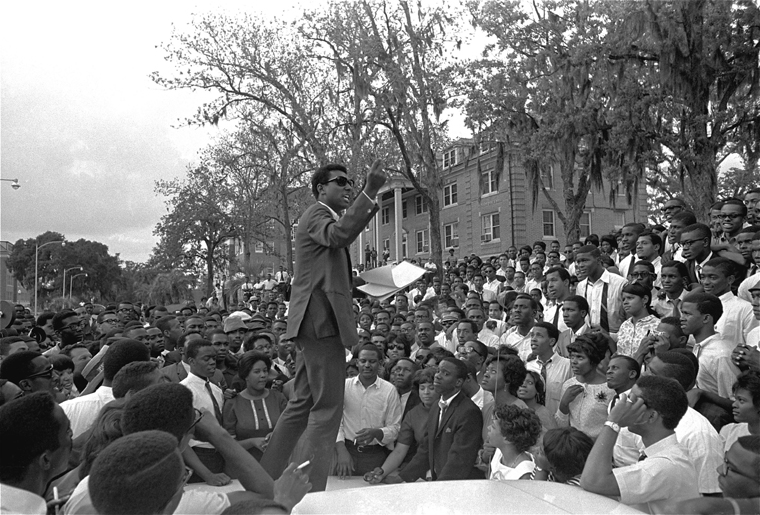
Excerpt from Fredrick Douglass by William S. McFeely
Shortly after the [Emancipation] proclamation was issued, Governor John A. Andrew of Massachusetts called for volunteers for what became the famous Fifty-fourth Massachusetts Volunteers. Still marching, on the Boston Common, in that greatest of American sculptures, Augustus Saint-Gaudens’s depiction of black men on the way to war, these soldiers were recruited not only in Boston, but in black communities all across the North.
George Luther Stearns, one of the six whites who had backed John Brown, was now a major and headed the recruitment effort. In the eyes of bitter Southern planters, by putting guns in black men’s hands, Stearns was making good on his mentor’s promise of raising an insurrection. As in Brown’s day, however, the black men were skeptical about serving in a white man’s army…Thomas Wentworth Higginson, another of the Secret Six, on the Sea Islands to raise the First South Carolina Volunteers, warned a Worcester neighbor who wanted to enlist, “If taken prisoner by the rebels…you would probably be sold as a slave.” Stearns, recognizing the problem of recruiting free Northern black soldiers, went to Rochester early in February 1863 to seek Douglass’s help.
The editor needed no persuading; in the March issue of Douglass’ Monthly appeared his call for volunteers, bearing the famous title “Men of Color to Arms.” Joining other black leaders as Martin Delany, Henry Highland Garnet, George T. Downing, William Wells Brown, and Jermain Wesley Loguen in recruiting, Douglass traveled across upstate New York, persuading young men to enlist, and he proudly informed Gerrit Smith that the first man he had signed up was his youngest son, Charles. In all, Douglass sent over a hundred young men from upstate New York, to the famous Fifty-fourth Massachusetts. On March 27 Douglass arrived in Boston with one contingent, including Charles and his oldest son, Lewis, and escorted them to the encampment in Readville, outside the city, where the first recruits had been since February….
Boston was too curious; the city’s legendary reserve yielded before the chance to glimpse the wonderful happenings in the bleak barracks in Readville. On April 21, the Ladies Committee, the auxiliary of the group of men sponsoring the regiment, came out for a look; on April 30, the Fast Day called by President Lincoln to bolster the Union’s determination, Governor Andrew was there, With Secretary of the Treasury Salmon P. Chase. And on May 18, the governor was back, to present the regiment with its colors.
Frederick Douglass was one of the distinguished guests who filled the carriages and extra trains that brought the crowd to Readville that day….
Governor Andrew, as he addressed Colonel Shaw, was surrounded by the men, drawn up in formation. “Now, he said, “in the Providence of God, [they have] given to them, an opportunity while it is personal to themselves, is still an opportunity for a whole race of men. With arms possessed of might to strike a blow, they have found breathed into their hearts an inspiration of devoted patriotism and regard for their brethren of their own color, which has inspired them with a purpose to nerve that arm, that it may strike a blow which, while it shall help to raise aloft their country’s flag – their country’s flag, now, as well as ours – by striking down the foes which oppose it, strikes also to the last shackle which binds the limbs of bondmen in the Rebel States.”
At six-thirty in the morning of May 28, 1863, with orders to ship out of Boston for the Sea Islands, the Fifty-fourth traveled by train from Readville into the city….A crowd cheered as the men in the ten companies left the cars. (The police, whatever their personal reactions to black men with guns, must have been relieved that there was no repeat of the kind of assault Douglass, armed only with words, faced in Boston just two Decembers earlier.) The companies formed into marching order and, behind solemn faced drummer boys, started through the streets of the city. From the sidewalks and windows, the curious watched, and much of patriotic Boston – and all of antislavery Boston – cheered. Handkerchiefs flutters, the cheering rose, and so did the spirits of the new soldiers stepping steadily forward. Somehow, bigger, stretching to fill their still-new uniforms, they were now truly the men of the Fifty-fourth Massachusetts…
About noon, marching to the music of “John Brown’s Body,” they moved out along Tremont Street and the streets of downtown Boston to the Battery Warf…Frederick Douglass was one of those who stayed on the dock until the ship, bearing his oldest son, was out of sight.

